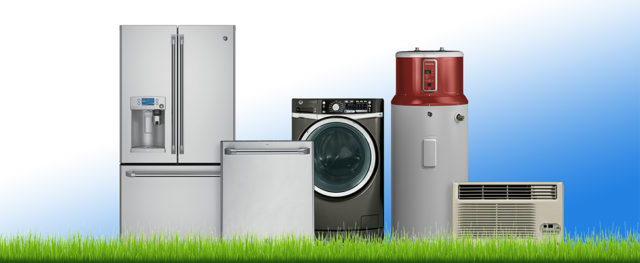
Household Appliances
Going green and environmentally friendly is becoming less of an option in the modern world, and more of a necessity for the common good. With the rising risks of global warming and the deteriorating ecosystem, it becomes all the more important for every individual to contribute to the preservation of the planet. Not only will implementing greener solutions make your home an eco-friendly powerhouse, it will also be beneficial to the mind as well as your budget.
Here’s how to make the best out of your common household appliances.
Microwave
The microwave is a perfect invention for reheating food, but it can also be the perfect energy waster. To reduce the amount of wasted energy while operating a microwave, you first have to make sure it’s cleaned properly. If the interior of your microwave is covered with food residue, plenty of energy can go to waste. When food residue builds up, it creates a sort of a buffer between the microwave walls and the food you’re trying to heat up, wasting electricity and releasing unpleasant odors.
Secondly, try to avoid using the microwave for defrosting purposes. Albeit a very handy technique for quickly defrosting foods, it consumes plenty of energy. It’s more economical to leave the food out to slowly defrost the night before, or even in the morning, before deciding to use the microwave.
Refrigerator
You need to keep the refrigerator in good shape in order to save energy and for it to work properly. Luckily, modern refrigerators are self-defrosting, so you don’t have to worry about the fridge not working due to ice build-ups. However, the refrigerator still remains one of the biggest energy spenders in the house, and there are a number of ways you can minimize energy waste and consumption.
First of all, the fridge needs to be clean. Keeping the fridge sparkly clean will not only prevent any bad smells from forming, but it will also enable it to run smoothly and efficiently. Cleaning the fridge will allow you to leave it on a moderate cooling regime, instead of having to crank up the temperature, which consumes far more energy.
Secondly, remember to keep the temperature at medium, and try to stack the fridge as much as you can in order to use its full potential ‒ when you leave the fridge half-empty all the time, you’re needlessly wasting all of that energy.
Dishwasher
One of the biggest household energy consumers is the dishwasher. Old-school dishwashers consume tons of electricity and water resources, and waste a lot of it in the process. Luckily, there are several solutions you can implement to make your dishwasher both eco- and budget-friendly.
The most effective way to battle energy and water waste is to get a modern dishwasher. Contemporary devices, as the latest Viking dishwasher units, have smart technology allowing them to assess the amount of water and electricity needed, in addition to reducing waste.
However, if you want to make the most use out of your dishwasher before moving to a newer model, there are a number of ways you can try to reduce waste. First, make sure the load is always full. This will keep the dishwasher running optimally.
Avoid washing the dishes by hand before popping them into the dishwasher. Modern dishwashers don’t really need your help with cleaning, so you can save energy and resources you would otherwise spend on pre-washing the dishes. Also, avoid setting the water heat too high, as modern dishwashers don’t need that much heat to clean the dishes, which also consumes plenty of energy.
Washing Machine
You can minimize the amount of waste by programming the washing machine to use less water and lower temperatures. Also, try to always fill up the washing machine to use up its potential. Only use high temperatures for deep, dark stains and avoid using it for natural materials like cotton, as it tends to shrink.
Implementing these eco-friendly solutions will not only benefit the environment, but they will also benefit your monthly budget significantly. Be sure to try out these methods and reap the benefits of a greener lifestyle.
 WhosGreenOnline.com Your Online Magazine and Directory for Green Business, Product, Service and News!
WhosGreenOnline.com Your Online Magazine and Directory for Green Business, Product, Service and News!


One comment
Pingback: 5 Eco-Friendly Alternatives to Using Appliances in the Home | WhosGreenOnline.com